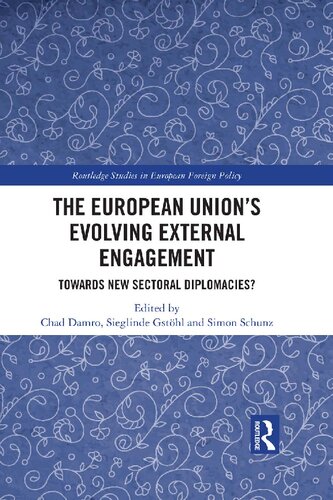

Most ebook files are in PDF format, so you can easily read them using various software such as Foxit Reader or directly on the Google Chrome browser.
Some ebook files are released by publishers in other formats such as .awz, .mobi, .epub, .fb2, etc. You may need to install specific software to read these formats on mobile/PC, such as Calibre.
Please read the tutorial at this link: https://ebookbell.com/faq
We offer FREE conversion to the popular formats you request; however, this may take some time. Therefore, right after payment, please email us, and we will try to provide the service as quickly as possible.
For some exceptional file formats or broken links (if any), please refrain from opening any disputes. Instead, email us first, and we will try to assist within a maximum of 6 hours.
EbookBell Team

4.8
64 reviewsIn recent decades, the external action of the European Union (EU) has been undergoing considerable change. An expansion of the EU’s external policy portfolio can be observed in many areas as previous policies for internal purposes – such as competition, energy, the environment, justice and home affairs or monetary governance but also gender, science, culture or higher education – have developed external dimensions.
This book addresses the EU’s potential to become a more joined-up global actor in its external engagement. It uses a single and innovative analytical framework to examine three clusters of policies: EU internal sectoral and cross-cutting policies with long-standing external engagement, those which have been undergoing considerable change, and originally internal policies whose external dimensions are comparatively more recent. It identifies key explanatory factors for the emergence of (certain forms of) EU external engagement and identifies patterns of the evolving relations between EU internal and external sectoral policies. As such, the book examines and assesses exciting new empirical and theoretical research avenues into European integration studies and offers insights into the extent to which the EU may be considered a more joined-up global actor developing sectoral diplomacies.
This text will be of key interest to scholars and students as well as practitioners in the fields of European Union politics, European Union foreign policy, European Politics, diplomacy studies, and more broadly law and international relations.